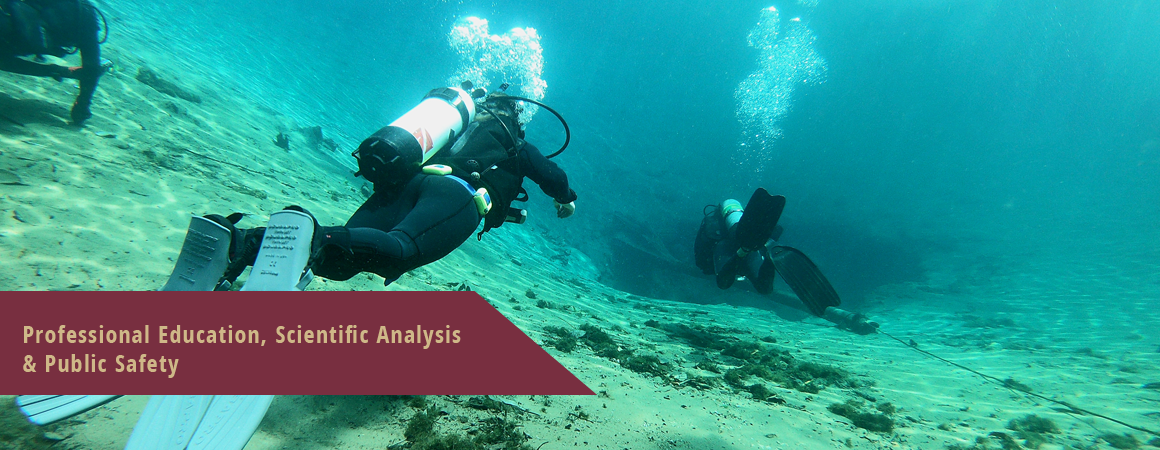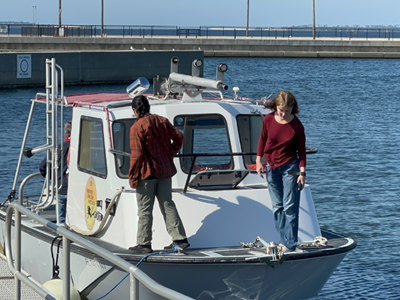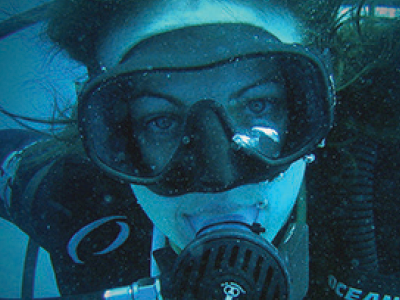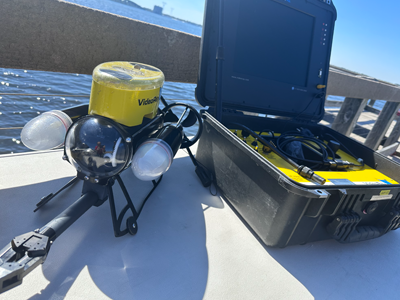
What can I expect from the Advanced Science Diving Program at FSU PC?
The Advanced Science Diving Program (ASDP) at FSU Panama City provides elite instruction in scientific diving, support of aquatic research and assistance with law enforcement investigation.
As part of a preeminent University, the Program provides research-driven capabilities and solutions for commercial, educational and governmental partners.
Our strategic mix of education, technology and experience in conjunction with our goal-driven processes and client-focused service are what set us apart.
-
Expert Solutions in Core Areas
Our diving experts and instructors analyze, research, design and implement solutions in the areas of:
- Protocol development, testing and evaluations
- Tactics, techniques and procedure development
- Phase I archeological surveys
- Level I and II material Inspections
- Hydrographic surveys
- Bottom Contour Mapping
- Bottom Sonar Survey with visual identification to 200 feet
- Material search and recovery to 130 feet and 200 pounds
- Cavern and cave search and recovery
- Body search and recovery
- Crime scene evidence documentation and recovery
- Contaminated water diving
- Curriculum development
-
On-Site Technology
ASDP retains on-site technology to support the myriad of core capabilities, including:
- VideoRay© Remotely Operated Vehicles
- Videography and photography
- Marine Sonic Technology© Side Scan Sonar
- Sea Hunter© Mark II Discriminator
- Sound Metrics© DIDSON Diver Held Sonar
- Kongsberg© Sector Sonar
- Blueview© Multi-Beam Sonar
- Resident Watercraft



Advanced Science Diving Program curriculum
Students completing the undergraduate or graduate Advance Science Diving program curriculum, as listed below, will earn scientific diver accreditation through the American Academy of Underwater Sciences, which will enable students to take advantage of external diving scholarship and research opportunities.
Labs now offered at FSU Panama City or FSU Tallahassee campuses.
Undergraduate Advanced Science Diving students must:
- Complete the required number of undergraduate credit hours (8) from the approved list of courses.
- Earn a grade of “C minus” or higher in each of the undergraduate courses and labs.
ISC 3062 - Introduction to Underwater Investigation (3) presents the history, principles of basic hyperbaric science diving, physics and physiology as they relate to diving. This course provides the theoretical foundation for individuals preparing to be divers.
ISC 3062L - Introduction to Underwater Investigation Lab (1) presents the principles and practice of compressed-gas as a life-support system for underwater hyperbaric exposure. This course is designed to develop proficiency in the basic skills required to perform safe underwater operations. Certifications earned: Open Water and Advanced Open Water Diver.
ISC 3063 - Scientific Underwater Investigation (3) builds upon the Introduction to Underwater Investigation course by providing the technology to collect data in an underwater environment according to the scientific method. The course the techniques used in science disciplines that function underwater.
ISC 3063L - Scientific Underwater Investigation Lab (1) builds upon the Introduction to Underwater Investigation Laboratory course by providing the tools and techniques to collect data in an underwater environment for prolonged periods of time. The underwater data collection techniques use traditional underwater technology and techniques for data gathering related to scientific disciplines. Certifications earned: Enriched Air (EANx) Diver and American Academy of Underwater Sciences (AAUS).
Graduate Advanced Science Diving students must:
- Complete the required number of graduate credit hours (8) from the approved list of courses.
- Earn a grade of “B” or higher in each of the graduate level courses and labs.
ISC 5060 - Introduction to Underwater Investigation (3) presents the history, principles of basic hyperbaric science diving, physics and physiology as they relate to diving. This course provides the theoretical foundation for individuals preparing to be divers.
ISC 5060L - Introduction to Underwater Investigation Lab (1) presents the principles and practice of compressed-gas as a life-support system for underwater hyperbaric exposure. This course is designed to develop proficiency in the basic skills required to perform safe underwater operations. Certifications earned: Open Water and Advanced Open Water Diver
ISC 5061 - Scientific Underwater Investigation (3) builds upon the Introduction to Underwater Investigation course by providing the technology to collect data in an underwater environment according to the scientific method. The course the techniques used in science disciplines that function underwater.
ISC 5061L - Scientific Underwater Investigation Lab (1) builds upon the Introduction to Underwater Investigation Laboratory course by providing the tools and techniques to collect data in an underwater environment for prolonged periods of time. The underwater data collection techniques use traditional underwater technology and techniques for data gathering related to scientific disciplines. Certifications earned: Enriched Air (EANx) Diver and American Academy of Underwater Sciences (AAUS).
Students who are interested in earning an undergraduate or graduate Underwater Crime Scene Investigation (UCSI) certificate, please refer to the UCSI Certificate webpage for more information.
External diving scholarship opportunities
- The AAUS Foundation awards several scholarships to graduate students engaged in, or planning to begin, a research project in which diving is an important research tool or the research topic is diving science. This includes awards for travel, equipment and research expenses. The proposal deadline is June 30th. Learn More
- The Academy of Underwater Arts & Sciences (AUAS) is overseeing applications to the Zale Parry Scholarship Program. FSU graduate student Nate Spindel was awarded this scholarship in 2018. The program is open to those candidates who are currently enrolled in a graduate school program (Masters or Ph.D.) in the diving fields of study (Marine Conservation and Education, Diving Medicine and Hyperbarics, Ocean Engineering, and Underwater Archeology). Due to the pandemic, applications are not being accepted at this time. You can monitor the status of the scholarship on the AUAS website. Learn More
- The Women Divers Hall of Fame is offering 20 training grants for open water dive training. Each grant is for $1000. Training grants are available to provide funding for underwater training and/or including scuba equipment. The deadline for applications is May 31st. Learn More
- Our World Underwater Scholarship Society awards a Rolex North American Scholarship to provide a hands-on introduction to underwater and aquatic-related endeavors for a student diver considering a career in an underwater-related discipline. The range of experiences may include active participation in field studies, underwater research, scientific expeditions, laboratory assignments, equipment testing and design, photographic instruction, and other specialized assignments. Applications are due December 1st. Learn More
- PADI Foundation Scholarships encourages and supports research and education related to aquatic environments. Applications are accepted beginning November 1st and are due January 10th. Learn More
